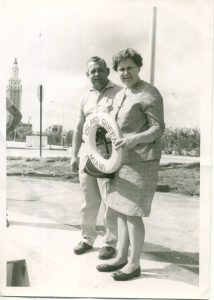I had a tough spell of moderate depression that started two weeks ago and just ended recently.
I had little energy. I was glued to my seat. Before this, I had been exercising religiously three times per week. I noticed that exercise had a wonderful cumulative effect on my mood that carried over from day-to-day as long as I kept at it. I actually looked forward to going to the gym.
But then, something happened. I got a horrible head cold. I couldn’t work out. As I laid on the couch, I felt myself sinking. I was cranky. More followed.
 I got a call a few weeks ago from folks that wanted to write an article about my parents and I. They had found me by reading a blog I had written, Our Parents, Our Depression.” They interviewed me then asked if I would rummage through some old pictures of my parents. I dug around in some boxes. I found an old black and white of my parents. Probably when they were in their early fifties. It brought me down. They had depression also. Though I didn’t know that as a child. And they probably didn’t think of it that way. But they clearly had all the symptoms.
I got a call a few weeks ago from folks that wanted to write an article about my parents and I. They had found me by reading a blog I had written, Our Parents, Our Depression.” They interviewed me then asked if I would rummage through some old pictures of my parents. I dug around in some boxes. I found an old black and white of my parents. Probably when they were in their early fifties. It brought me down. They had depression also. Though I didn’t know that as a child. And they probably didn’t think of it that way. But they clearly had all the symptoms.
This whole thing brought up a lot of sadness. Some of it because of the unhappy lives they led – much of it punctured by episodes of depression, drinking, and violence. I feel connected to them still years after their deaths. I thought about how powerful the link, genetic, emotional and psychological, is between where we come from and where we find ourselves now. Given this history, I sometimes feel like my depression is insurmountable. Why even try? I think. It’s just going to come back away.
So, back to working out. I just couldn’t get going. Just thinking of the 10-minute drive from Starbucks made me weary. I drank more coffee to get a boost, but it had no effect.

I started feeling a bit better yesterday. I still didn’t want to go to the gym but had enough energy to push through my resistance. I got to the gym parking lot. My legs felt heavy as walked to my workout. I got through 20 minutes on the elliptical and pumped weights. I felt great the rest of the day and today the depression is gone. I feel back to my old self. While exercise and movement aren’t a panacea, it is one powerful tool to coping with this onerous illness.
This experience taught me something: exercise isn’t just something that healthy for someone like me who has depression. It’s essential. It has powerful effects on the brain that are difficult to achieve with therapy and/or medication. In fact, for mild to moderate levels of depression, studies show that exercise is just as effective as the meds. As it turns out, exercise actually boosts the positive effects of antidepressants.
So build up a regular workout regimen. There will be times that you’ll fall off the wagon. You’ll find that working out just doesn’t isn’t working out when you’re blue.
But get back on the wagon. And get your heart and spirit pumping again.
Check out the excellent book, Spark: The Revolutionary New Science of Exercise and the Brain for a wonderful explanation of what goes on in the brain during a depression and how exercise counteracts it.
Copyright, 2016 by Daniel T. Lukasik
 “Human beings are designed for regular physical activity. The sedentary nature of modern life probably plays a significant role in the epidemic incidence of depression today.” Andrew Weil, M.D.
“Human beings are designed for regular physical activity. The sedentary nature of modern life probably plays a significant role in the epidemic incidence of depression today.” Andrew Weil, M.D.










